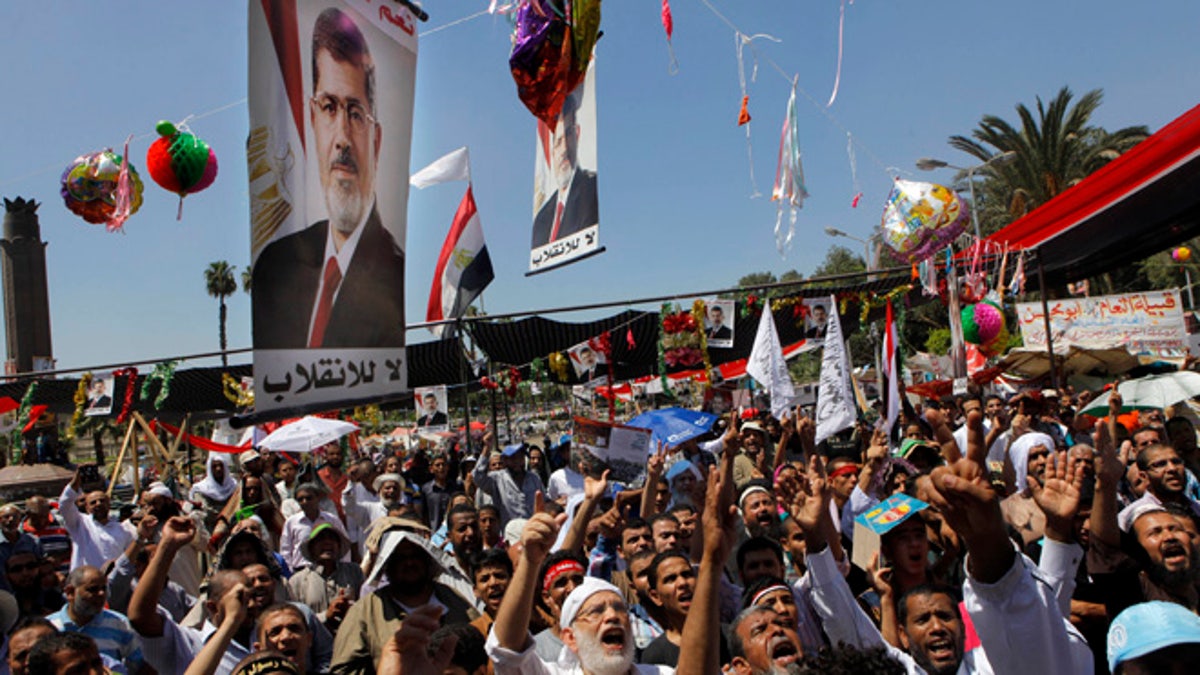
Supporters of Egypt's ousted President Mohammed Morsi shout slogans under his posters following Friday prayers in Nahda square, where protesters installed their camp near Cairo University in Giza, southwest of Cairo, Egypt, Friday, Aug. 9, 2013. (AP)
WASHINGTON – Egyptians have turned their fury recently on Robert S. Ford, the former U.S. ambassador to Syria now being considered as the next ambassador to Egypt, in light of unfounded rumors on a Canadian website about his past actions in Iraq.
Not only do his chances of taking over from current Ambassador Anne Patterson seem in jeopardy, Washington is now in a position of having to struggle even harder to repair its reputation in the region.
“It is a very difficult task,” Mohamed Elmenshawy, director at the Middle East Institute in Washington, told FoxNews.com. “Given the level of anti-American sentiment from all Egyptian political players, Ford has serious challenges ahead of him. It will take serious initiatives by the U.S. to recover its reputation in Egypt in order to make the mission of the new ambassador easier.
Earlier this week, State Department spokeswoman Jen Psaki told a roomful of reporters that “we have determined that we do not have to make a determination,” on whether the U.S. government considered the recent Egyptian military uprising a coup – which could affect U.S. aid there.
Her semantic somersaults – and those of the Obama administration - are just the latest examples of political indecision fueling frustrations over what the country’s policy is and where U.S. loyalties lie.
The anti-American sentiment has been growing on both sides of the political divide in Egypt, with resentment toward Patterson reaching an all-time high. She has managed to simultaneously infuriate reformist protesters while also ruffling the feathers of regime loyalists.
In 2011, the same year she was appointed to the position, Patterson was branded “the ambassador from hell” by Egyptians and accused of everything from promising pyramids to Israel to cozying up to the Muslim Brotherhood.
Protestors in Cairo carried signs with her face crossed out while others chanted for her to go home. A common picture plastered around the Egyptian capital city was one of her face with the word “Hayzaboon” across it – meaning “ugly old woman.”
“Part of the problem Anne Patterson faced was a vacuum in policy,” Vali Nasr, the dean of the School of Advanced International Studies at John Hopkins University told The New York Times. “If she went and met with the Muslim Brotherhood, it was construed that she was pro-Brotherhood. If she met with the military, the Brotherhood thought she was giving a green light to a coup.”
Most recently, she has been tapped to become assistant secretary of state for Near Eastern affairs and the Obama administration began searching for her replacement.
In Washington, whispers grew louder by the day that the president would tap Ford to fill the vacancy in Egypt.
But soon after news organizations reported that Ford was the likely successor, a Canadian website known mostly for concocting conspiracy theories, including some about the Sept. 11 terrorist attacks in the U.S., claimed Ford ran “death squads” in Iraq when he was political counselor at the embassy there from 2004-2006.
Forty-eight hours later, the website gossip had spread to Twitter. Then, Egyptian newspapers started picking up the story. What followed was anger and accusations directed at both Ford and America itself.
Trying to navigate the choppy political waters in Egypt hasn’t been easy. The vitriol and violence continues to grow daily despite recent diplomatic visits from representatives of the United States, the European Union and Arab Gulf states in an attempt to defuse the crisis and come to a non-violent compromise.
But as of now, the chances of that happening don’t appear likely.
In the past month, more than 250 people have been killed in Egypt in fighting between supporters of ousted President Mohammed Morsi, a member of the Muslim Brotherhood, and security forces.
On Tuesday, Sens. John McCain, R-Ariz., and Lindsey Graham, R-SC, traveled to Egypt. The men urged the government to release Islamist leaders as a gesture of good will to the Brotherhood.
Egypt’s interim President Adly Mansour rejected the idea and basically told McCain and Graham to stay out of their country’s politics. The senators say they went to Egypt at the request of Obama, but their message conflicted with the one the White House has been pushing – and that, some say, is a big part of the problem.
“McCain sends double messages,” Elmenshawy said, adding, “(McCain) showed that the U.S. does not have a clear and united voice when it comes to dealing with Egypt. Hence that Egyptians do not understand the dynamics of American politics. For them McCain was speaking on behalf of America, not on behalf of the Senate or even on behalf of himself.”
In a Washington Post op-ed published Friday, McCain and Graham urged Egypt's leaders to embrace democratic governance and release political prisoners, including Morsi supporters.
"It is essential for all people and parties in Egypt to look forward, to resolve their differences peacefully through an inclusive dialogue and to make the difficult compromises and painful sacrifices that are necessary to save their country," the senators wrote.
Calls to McCain for comment were not returned.




